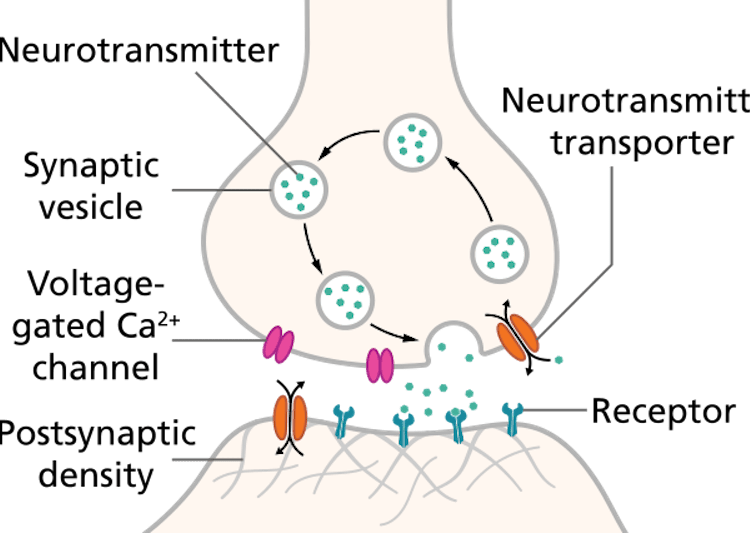How To Think Clearly Again By Optimizing Your Neurotransmitters
Your brain has almost limitless potential; a veritable sea of cells, nerves, neurons, and biochemical reactions are regulating everything from your breath and heartbeat to the actions you take as you prepare for your next virtual meeting – typing up transcripts, rehearsing dialogue, and preparing your workspace for discriminating viewers. The ‘simple’ task of reading this article, understanding and assimilating this information for future use, involves more neurological connections than you’d imagine. Your brain is a wondrous, intricate network that serves as central command for you twenty-four hours a day, seven days a week.
It‘s a commonly held theory in most scientific circles that even the most intelligent of us only use between 10-14% of our brain’s potential power. Can you imagine the implications for all of humanity as a whole if we were to maximize our brain potential?
Please note: the information and recommendations presented in this article shouldn’t be construed as medical advice. Rather, they’re presented to help form the basis of a discussion to have with your doctor regarding what changes might be right for you.

Neurotransmitters: The Tireless Messengers
Neurotransmitters are chemical molecules that are synthesized within brain cells. They allow for the transfer of vital information between brain cells that govern and regulate nearly every system in your body. Neurotransmitters provide the chemical jumpstart for the transfer of data from cell to cell.

How Does Neurotransmitter Signaling Work?
A neurotransmitter is released from a “sending cell” into a space called a synapse, which then connects to a “receiving cell” in the brain. As they do so, they bind to substances known as receptors – chemicals that set off a chain reaction of events that send the initial signal further and further into the brain. Each of the trillions of synapses in the brain provides an interface for regulating chemical and electrical homeostasis; they’re the lifeblood of the brain, and keeping them in tip-top shape ensures that your brain is healthy and optimized.

Neurotransmitter Problems: How They Manifest
The neurotransmitter process in the brain can be simplified into the following steps:
- A pre-synaptic cell, called an axon, prepares to send a message across the synaptic cleft, a small gap in between cells.
- With stimulation called an action potential, the neurotransmitter passes the information to the post-synaptic cell, causing chemicals to bind to its receptors.
- A series of electrical stimulation and chemical reactions take place according to the type of information that was passed through the synaptic cleft.
- Any remaining stimulation via a neurotransmitter that’s still left in the pre-synaptic cell or across the synaptic cleft will get processed via specialized enzymes that clear the way for new transactions to take place.
When any part of this process is inefficient or “sludgy,” it can result in mental, physical, and emotional dysfunction that causes us to feel less than our best. A deficiency in the process of serotonin production, for example, could result in depression, sluggish thinking, anxiety, panic attacks, eating disorders, and migraine headaches.
Knowing that any disruption of the delicate balance needed for optimal brain function could cause many issues, it becomes essential that we learn to protect this neurotransmitter process and create life conditions that stimulate and protect ultimate brain health. So, how do we do this?
An Insurmountable Task?
It’s relatively easy to make small yet effective changes to daily life to promote healthy brain function and keep those neurotransmitters working smoothly. The following steps will greatly help toward optimizing brain function, but be sure to consult with your doctor before undertaking any of the following:
- Avoid antidepressants, if possible. Receptors in your brain, kidneys, liver, and colon can be damaged with continued antidepressant use; as your brain becomes “addicted” to these chemicals, it requires them in larger amounts to produce the same chemical effect that can be created naturally in a healthy brain.
Reducing or eliminating your dependence on antidepressants will bring your body and brain back into a state of homeostasis once more, “stimulating” your body to naturally regulate processes as it was intended to do. If you’re currently under the care of a physician for any depressive disorder, talk to your doctor about any medication changes you wish to make, as attempting to do so without medical supervision could cause additional mental and physical health issues.
- Reign in the stimulant use. It’s difficult for many of us to imagine life without coffee; we start the day with it as a means of jumpstarting energy levels and promoting greater mental clarity. Studies have shown that moderate stimulant use can actually improve neurological stimulation in the brain.
A problem arises when we take our use of stimulating substances from moderate to extreme; your brain responds to increased caffeine consumption by creating additional adenosine receptors. Chemical reactions in the brain involving adenosine bring about that feeling of tiredness that we try to avoid. As a result, we keep reaching for that which wakes us back up, perpetuating a vicious cycle of artificial energy, and a brain that is working overtime to correct the imbalance.
- Avoid exposure to toxins. How are we supposed to manage that? From the use of products containing chemical additives to working and living in places where we’re exposed to artificial cleansing products and airborne toxins from dirty ventilation systems, this task seems enormous. Not to worry; your body can handle a certain amount of toxic buildup, as long as you take steps to help the cleansing process along. You can do that by consuming organic fruits and vegetables regularly; using natural cleaning products and personal care products without added chemicals; implementing the use of a home air purifier or water filtration system; and finding a great holistic dentist to manage your oral health. Small steps implemented regularly will result in some pretty significant changes in your brain and your body over time.
- Remove sensory stimuli. We’re bathed in sound, energy frequencies, and excess stimulation all day long, and our brains were not necessarily designed to handle all of the excess stress that comes with overstimulation. All of this extra gobbledygook results in poor neurological operation, as it forces the brain to produce additional “calming” chemicals to reduce stress. Help a brain out, why don’t you? Consider taking these actions to unplug from a busy, bustling life for a while:
- Turn off the electronics
- If you work with a computer, take frequent breaks
- Take time each day to appreciate silence – no music or electrical stimulation
- Spend time outdoors in nature, bathing yourself in natural light
- Refrain from using all electronics at least one hour before bed
- Improve your gut health. Research shows with increasing clarity that there’s an intimate link between the health of your brain and the health of your gut. In fact, a significant portion of neuro-transmitting chemicals are initially produced in the gut and then transported to your brain; it makes sense, then, that an unhealthy microbiome has a significant impact on the function of your brain. Review these tips for bringing the gut back into balance and improving brain health.
- Build with the essentials. A host of neurotransmitters are comprised of amino acids, the vitamin B family, and essential minerals. A deficiency in any of these critical nutrients can leave you with holes in your foundation. Consider these foods and supplements to provide yourself the necessary tools for neurotransmitter creation:
- Amino acids: salmon, beef, chicken, eggs, dairy foods, almonds and almond butter, spirulina, and chlorella
- B vitamins: spinach, bell peppers, turnip, and mustard greens, asparagus, liver, and lentils
- Minerals: whole foods, goat protein, trace minerals in liquid form
- Lubricate those nerves. Your entire nervous system is wrapped up in protective myelin sheaths, which can be likened to the way a car engine is lubricated with oil to make it work more efficiently. When these protective sheaths get broken down or compromised, it results in a nervous system that doesn’t send and receive messages that are needed for all sorts of system functions. Foods that are rich in omega-three fatty acids like walnuts, cold-water fish, grass-fed beef, greens, and avocados will keep the integrity of the myelin sheath intact, and provide essential lubrication for those very important nerves.

Steady As She Goes…
If you are starting in a place of disease and dysregulation, implementing these changes without the advice and supervision of a trained physician could have lasting health consequences. It’s best to seek the advice of those trusted and trained medical professionals around you as you seek to improve your health and wellness.
Optimizing brain function is a lofty goal, but it’s one that can be achieved with smart, quantifiable actions that produce measurable results over time. Working in cooperation with your doctor will maximize your efforts, and allow you to experience vibrant physical health and mental function once more.
